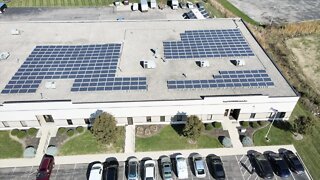Premium Only Content

SOLAR POWER IN FLORIDA
Upcoming Changes to Solar Systems in Florida! SB 1024
https://www.solarpowerworldonline.com/2021/11/florida-legislature-considers-ending-solar-net-metering/
https://zenernet.com/changes-could-be-on-the-way-for-florida-net-metering/
https://gosolargroup.com/florida-solar-incentives/net-metering/
https://www.theguardian.com/environment/2021/dec/20/revealed-the-florida-power-company-pushing-legislation-to-slow-rooftop-solar
https://pv-magazine-usa.com/2021/11/22/florida-senator-files-bill-that-would-lower-solar-net-metering-compensation/
From PV magazine
Florida bill would cut solar net metering compensation
The bill would shift compensation rates to the utility’s avoided cost of generation, and open the door for a host of fixed charges aimed at solar.
Florida’s net metering program was established in 2008 under Florida Administrative Code Rule 25-6.065. Within that rule, residential and commercial customers with systems less than 2 MW in capacity are eligible to sell their excess generation back to the utility at the full retail electrical rate on their monthly bill.
Florida Senator Jennifer Bradley’s bill would change the existing net metering structure from one that promotes the development of renewable energy resources in this state, to one that purports to “continue” development “in a manner that is fair and equitable to all public utility customers.” Andrew Sendy, CEO of SolarReviews.com explained in an op-ed for pv magazine USA, “Solar consumers produce their own solar power on-site, meaning that they are not using their distribution and transmission systems (aka “the grid”). Therefore, the argument goes, they [net metering customers] are not paying their fair share of upkeep of the grid.
Ensure that public utility customers owning or leasing renewable generation pay the full cost of electric service and are not subsidized by the public utility’s general body of ratepayers.
Ensure that all energy delivered by the public utility is purchased at the public utility’s applicable retail rate and that all energy delivered by customer-owned or -leased renewable generation to the public utility is credited to the customer at the public utility’s full avoided costs.
The bill would also allow utilities to add in base facilities charges, electric grid access fees, monthly minimum bills, or other fixed charges to customers’ bills in order to ensure the utility recovers their cost of serving net metering customers.
existing net metering customers who had their system operational before Jan. 1, 2023 would be grandfathered in to their previous compensation rate for 10 more years.
-
 1:29
1:29
martlet
3 years agoSolar power generator in California.
581 -
 2:24
2:24
TheOldHobbit
2 years ago $0.01 earnedSolar Generator - DIY power supply
57 -
 3:05
3:05
ColinHT
3 years ago110 set up from solar power
116 -
 4:04
4:04
1672Billy
3 years agoFlorida Light Power
811 -
 8:25
8:25
JohnGabrielHalley
3 years agoBuyCastings.Com Inc. Solar Power Project
23 -
 LIVE
LIVE
The Jimmy Dore Show
4 hours agoLiz Warren DEFENDS Big Pharma At RFK Hearing! Trump Dismisses Concerns Over NJ Drones!
10,219 watching -
 DVR
DVR
Space Ice
5 hours agoSpace Ice & Redeye: Van Damme's The Quest: Pirates, Clowns, James Bond & Bloodsport
15.1K1 -
 59:57
59:57
The StoneZONE with Roger Stone
3 hours agoJ6 Martyr Enrique Tarrio Describes Inhumane Prison Conditions Ordered by Biden | The StoneZONE
15.1K -
 16:48
16:48
Tundra Tactical
2 hours ago $0.23 earnedAffordable Medical Gear From ACETAC SHOT Show 2025
9.47K1 -
 1:46:16
1:46:16
Redacted News
6 hours agoRFK CONFIRMATION: Kennedy goes to WAR with Big Pharma Democrats in Fiery Hearing | Redacted Live
156K315